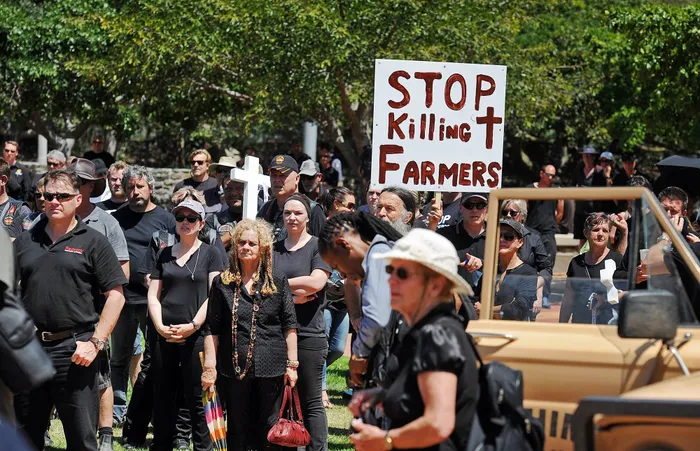SAPS urged to address misinformation on farm attacks and genocide claims

The Institute for Security Studies says police and agricultural unions should correct misinformation and the false narrative regarding genocide and farm murders in South Africa.
Image: David Ritchie, ANA
The SAPS, agricultural unions and private security firms have been requested to debunk and correct the misinformation and false narratives circulating on social media and other platforms on farm attacks in South Africa.
A policy brief released by the Institute for Security Studies (ISS) found that there is no evidence of any form of genocide taking place in the country.
The institute added that white people are statistically less at risk of violent crime than other racial groups as it explains why the country is so violent and why there is no evidence of a genocide.
This comes after the US State Department’s Bureau of Democracy, Human Rights and Labor (DRL) claimed that attacks on farms display a distinctly brutal pattern.
The bureau claimed that these were not ordinary crimes, adding that in some documented cases, reports detail victims tortured or killed without anything being stolen.
The bureau said local sources reported 296 farm attacks and 49 murders in 2023, adding that victims are disproportionately elderly, isolated and face delayed police response.
AfriForum said the report confirmed what the organisation had been emphasising for years, that farm attacks are not ordinary crimes.
The organisation added that farm attacks are brutal, targeted attacks that are often accompanied by torture, murder without anything being stolen and politically charged rhetoric such as the ‘Kill the Boer’ slogan.
However, the ISS, through its policy brief, found that a vast majority of farm attacks were motivated by robbery, not racial hatred, saying agricultural unions, the SAPS, private security and community leaders should actively counter misinformation and false narratives circulating via social media and other platforms.
AfriForum’s chief spokesperson for Community Safety, Jacques Broodryk, said it has never been the organisation’s position that there is genocide taking place in South Africa, adding their position is that there are unique elements to farm attacks that justify classifying it a ‘priority crime’, in the same way that taxi violence, gender based violence and illegal mining are classified as ‘priority crimes’ due to their unique nature.
“There are however genocidal calls made by influential figures such as the chanting of Kill the Boer, Kill the farmer. The chanting of the slogan has been directly linked to attacks on farms. If one however looks at the US’s legal definition of genocide, it is understandable why US officials can refer to farm attacks as a genocide,” he said.
ISS added that of the 49 who were killed on farms in 2023, not all victims were farmers, adding that the figure represents 0.2% of 27,621 murders reported during that period.
“Half of all murders in South Africa occurred in just 12% of police precincts. Most of these high murder areas are townships in metropolitan areas inhabited largely by black residents,” the institution said.
Agri SA executive officer Johann Kotze declined to comment.
Police spokesperson Athlenda Mathe said she was waiting for a response from her colleagues.
The ISS said the idea of a ‘white genocide’ has been around for many years, propagated by fringe or extremist groups.
However, there is no credible evidence to support claims of a ‘white genocide’ or any form of genocide taking place in South Africa. It added that multiple independent investigations have found no systematic or organised targeting of white people or farmers based on race or ethnicity, nor any indication that attacks aim to destroy an ethnic group or drive farmers from their land.
“These investigations include the 2003 Committee of Inquiry into Farm Attacks and the 2014 South African Human Rights Commission National Investigative Hearings into Safety and Security Challenges in Farming Communities,” ISS said.
The institute added that South Africa’s crime statistics show that most armed violent crime occurs in urban areas, mostly in public spaces such as streets or parks, but also in homes and businesses.
“Murder victimisation correlates more with class, gender and location than race. Lower income and high inequality are linked to higher rates of crime and violence. About half of all murders take place in just 12% of SAPS precincts, and 20% in fewer than 3% of stations – 30 in total,” said the ISS, adding that these areas are mostly townships or poor urban communities, mostly populated by coloured or black African people.
manyane.manyane@inl.co.za
Related Topics: